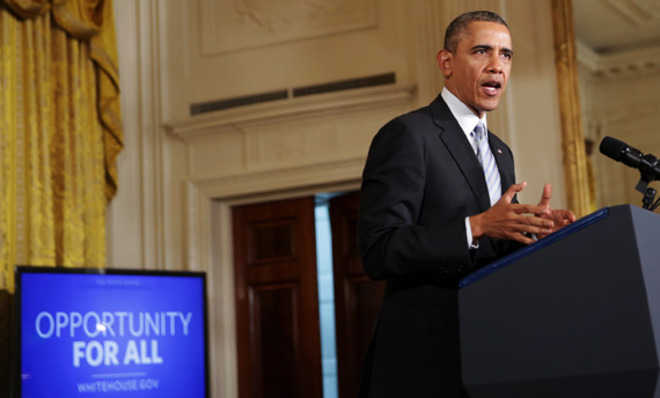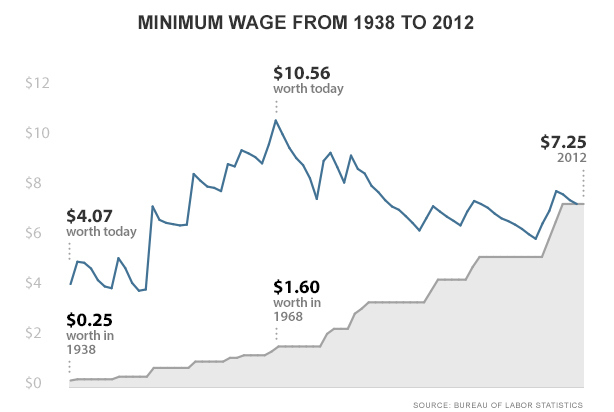How a $10.10 minimum wage could raise 4.6 million Americans out of poverty
A higher minimum wage would significantly boost incomes, and create jobs

Some economists scoff at the very concept of minimum wage. For instance, the free market economist Milton Friedman argued that the minimum wage causes unemployment by forcing employers to discriminate against employees whose working abilities justify a wage less than the legal minimum. Friedman argued that this could lead to more poverty, not less.
But some recent studies have found a good deal of evidence that increasing the minimum wage is not the job-destroyer or poverty-creator it is often portrayed as.
Arindrajit Dube of the University of Massachusetts-Amherst analyzed 23 years of data on past minimum wage increases, reviewed studies on the average drop in the poverty rate after a minimum wage increase, and calculated the average of those averages.
The Week
Escape your echo chamber. Get the facts behind the news, plus analysis from multiple perspectives.

Sign up for The Week's Free Newsletters
From our morning news briefing to a weekly Good News Newsletter, get the best of The Week delivered directly to your inbox.
From our morning news briefing to a weekly Good News Newsletter, get the best of The Week delivered directly to your inbox.
Based on this historical record, Dube calculated that if Congress were to pass a plan backed by President Obama to raise the minimum wage from $7.25 an hour to $10.10 an hour — a hefty 39 percent hike — it would result in a significant reduction of the poverty rate among Americans between the ages of 18 and 64, and raise about 4.6 million people out of poverty.
An important piece of context: The inflation-adjusted level of the minimum wage has fallen in recent years. So even a robust boost to the minimum wage would merely take its real value back closer to what it was in the 1950s and 1960s, decades of great prosperity for America and exceptional growth for the middle class:

A boost to $10.10 an hour would directly or indirectly increase the wages of some 27.8 million workers, who would take home around $35 billion in additional wages, which would increase their ability to spend.
So even if some jobs are lost due to businesses getting rid of workers who they would otherwise employ for less than the newly hiked minimum wage, the extra demand created by the workforce's pay raises ends up creating more jobs than the minimum wage hike destroys.
A free daily email with the biggest news stories of the day – and the best features from TheWeek.com
In total, the U.S. hiking the minimum wage is estimated to grow the economy by about $22 billion, while adding an estimated 85,000 net new jobs to meet the additional demand, according to another study by the Economic Policy Institute. This would benefit a diverse range of groups — women would make up 56 percent of those who would benefit. Eighty-eight percent of the beneficiaries would be at least 20 years old, around 55 percent would be full-time employees, more than a quarter would be parents, and over a third married.
Now obviously, the past is not necessarily a perfect guide to the future, and other studies estimate significant net job losses. Economies are highly complex and unpredictable. But the empirical evidence on past minimum wage hikes is pretty clear: They haven't been a job destroyer, or a poverty-creator. Quite the opposite.
John Aziz is the economics and business correspondent at TheWeek.com. He is also an associate editor at Pieria.co.uk. Previously his work has appeared on Business Insider, Zero Hedge, and Noahpinion.
-
 China’s Xi targets top general in growing purge
China’s Xi targets top general in growing purgeSpeed Read Zhang Youxia is being investigated over ‘grave violations’ of the law
-
 Demands for accountability mount in Alex Pretti killing
Demands for accountability mount in Alex Pretti killingSpeed Read Pretti was shot numerous times by an ICE agent in Minneapolis
-
 Will Nigella be the secret ingredient to revive GBBO?
Will Nigella be the secret ingredient to revive GBBO?Talking Point Lawson will bring yet more ‘eye-twinkling double entendres’ to a show that some say has ‘lost its way’